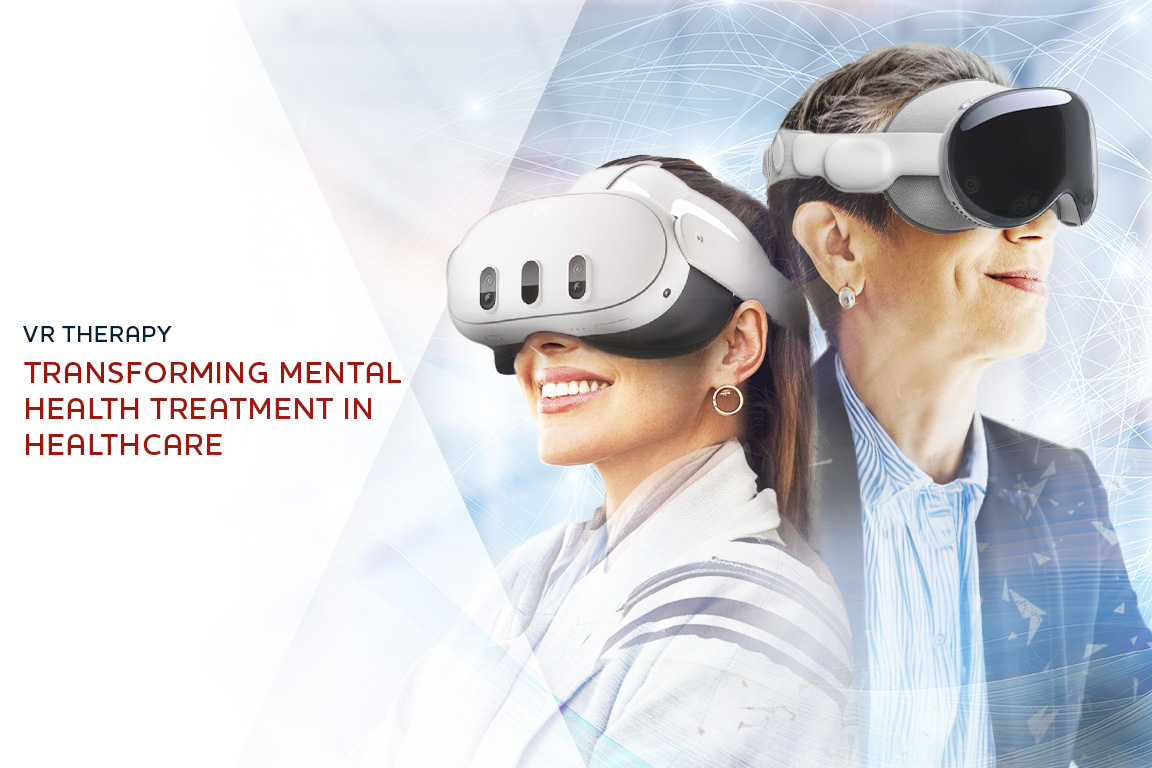Virtual reality (VR) stands at the forefront of a revolutionary approach to therapy, promising to transform the landscape of mental health treatment. By immersing patients in controlled virtual environments, VR technology enables a level of assessment and therapeutic intervention unprecedented in the field of mental health. This offers new avenues for managing conditions such as stress, anxiety, and beyond.
This innovative tool not only supports exposure-based treatments in a safe and controlled setting but also aligns with the objective of educating healthcare professionals, patients, and the general public about its potential to make mental health care more accessible, affordable, and effective. The rise of VR in healthcare reflects a growing acknowledgment of its benefits and applications, from pain relief to psychological training, without the risks associated with real-world exposure.
Benefits of VR Therapy in Mental Health
Virtual Reality (VR) therapy is emerging as a powerful tool in the field of mental health, offering innovative ways to address a wide range of conditions. The benefits of VR therapy extend from enhancing patient engagement to providing personalized and effective treatment options. Here, we delve into the numerous advantages that VR therapy brings to mental health care.
Personalization and Engagement
Effective Treatment Across Conditions
Enhanced Accessibility and Convenience
Superior Capabilities for Assessment and Treatment
Reduction in Pain and Anxiety
Patient Engagement and Experience with VR Therapy
Customization and Real-time Feedback Enhance Engagement
Virtual reality (VR) therapy’s ability to be programmed to match individual needs, abilities, or preferences significantly improves patient engagement and the effectiveness of treatment. This customization ensures that each patient receives a therapy experience tailored specifically for them, making the process more engaging and potentially more effective. Furthermore, the real-time, automated data capture in VR provides essential insights about mental health conditions, which can inform tailored treatments, making therapy sessions more efficient and focused on the patient’s specific needs.
Addressing Safety and Side Effects
While VR therapy offers numerous benefits, it’s crucial to acknowledge and manage potential side effects, including physical issues like dizziness, nausea, or eye strain, and psychological risks such as disassociation or increased anxiety. Being aware of these potential issues and addressing them proactively ensures a safer and more comfortable experience for patients, thereby maintaining their engagement and trust in the therapeutic process.
VR Therapy in Pain Management
VR solutions have been effective in managing both chronic and acute pain through positive distraction and cognitive behavioral therapy experiences. These experiences not only aid in pain relief but also help patients, including veterans, become less reliant on medication. The Department of Veterans Affairs (VA) has been a pioneer in using VR for various treatments, including chronic pain, demonstrating the potential of VR therapy in enhancing patient engagement and experience – “Some veterans also use their VR headsets for apps that provide a distraction to help with pain management — potentially helping them to reduce their reliance on medication.”
Reducing Dropout Rates Through Immersive Experiences
The immersive nature of VR therapy can significantly increase engagement and reduce dropout rates. This is particularly important considering global dropout rates for mental health therapy, where studies have found significant percentages of patients disengaging from therapy. VR therapy allows patients to repeatedly experience and overcome trigger situations through various challenges and levels, providing a more engaging and immersive experience that improves motivation and adherence to treatment plans.
By addressing these key areas, VR therapy not only enhances the patient experience but also contributes to the broader goal of making mental health care more accessible, affordable, and effective.
Challenges and Considerations for Practitioners
While virtual reality (VR) therapy offers groundbreaking potential in mental health treatment, practitioners face several challenges and considerations in its implementation. These challenges span from technical and ethical issues to the need for more comprehensive research and training. Understanding these factors is crucial for healthcare professionals aiming to integrate VR therapy into their practice effectively.
Technical and Design Expertise Required
Ethical and Privacy Concerns
Overcoming Barriers to Implementation
Managing Potential Risks
Training and Ethical Guidelines
By addressing these challenges and considerations, practitioners can harness the benefits of VR therapy to enhance mental health treatment, making it more accessible, engaging, and effective for patients.
Conclusion
Through the exploration of Virtual Reality (VR) therapy’s capabilities, it is evident that this innovative approach holds the power to fundamentally transform the landscape of mental health care. The benefits of VR therapy, ranging from its applications in treating a wide spectrum of mental health conditions to its potential to enhance patient engagement and treatment effectiveness, underscore its significance. Furthermore, the discussion on integrating VR therapy into mainstream care emphasizes the necessity of overcoming existing barriers, thereby making mental health treatment more accessible, affordable, and effective.
As we look to the future, the broader implications of VR therapy’s integration into healthcare are profound. By addressing the challenges and ethical considerations associated with its implementation, the medical community can unlock the full potential of VR as a cornerstone of innovative mental health treatment.

![[Approved] Enhancing Cardiology Device Launches Through XR [2026]](https://tipmedia.com/wp-content/uploads/2026/02/blog_feb_2-3.jpg)

